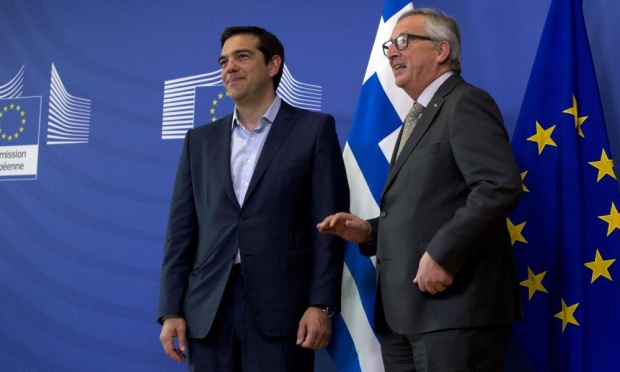The Greek government is yet to rally out of the financial crisis facing the nation amidst proposals of strict rationing by every other European leader involved including the International Monetary Fund.
Between all the back and forth on the reform proposals, the Greek nation has ceased to receive the international bailout packages allocated. Talks of planning and changing reform proposals from the international forum and also on the Greek side have been ubiquitously endless.
Now the Greek Prime Minister Alexis Tsipras has gone ahead to issue a statement in regards to the Greek government’s position on this contentious matter. According to him, the Greek government has formulated "a realistic proposal" to resolve issues of securing a deal over its debts from its international creditors.
This has been deemed a pre-emptive move on the part of the Greeks, coming up with a plan including concessions instead of just waiting for heavy sanctions imposed by the international forum. The Prime Minister’s words came hot in the heels of the talks in Berlin attended by the heads of both the European Central Bank and the International Monetary Fund.
The night time Berlin talks as reports have now suggested the presence of ECB Chief Mario Draghi, IMF Chief Christine Lagarde, French President Francois Hollande, German Chancellor Angela Merkel and European Commission head Jean-Claude Juncker. The talks were aimed at coming up with a concrete plan to present to Greece in dealing with its financial disintegration.
Mr. Tsipras has denied being contacted by the IMF, ECB or other European leaders; and has expressed his displeasure with the austere sanctions that international creditors have been proposing towards Greece.
Greece is supposed to make a payment of 305m Euros to the IMF coming Friday. This amount marks the first of the four payments totalling to 1.5bn Euros that Greece owes the IMF. There has been growing tumult and scepticism among creditors about Greece’s capability in paying back this amount due to lack of funds that might plunge Greece into defaulting its way out of the eurozone.
'Absurd proposals'
The hard-pressed Greek Prime Minister Tsipras has publicly hit out at the “absurd proposals” and “indifference to the recent democratic choice of the Greek people” being peddled by its creditors for being the main reason behind Greece’s inability to climb out of the debt zone.
Tsipras has called for realistic considerations before the European leaders reach a conclusion and has hence put forward its own financial proposal out of this mess.
Greece now remains in a four-month deadlock for release of 7.2bn Euros in bailout funds by international creditors. Creditors have been pushing for strict austere sanctions in return of the financial aid as Greece keeps on rolling against the cash-for-reform deal.
The other European leaders have welcomed the efforts of Germany and France in trying to reach reform conclusions to negotiate with Athens. Otherwise, a potential exit by Greece from the eurozone could have "gigantic consequences".
As of now, the Greek leadership has maintained being open to discussions but has stated outright that it would not accept hard proposals that contradict their country’s popular anti-austerity stance.
References:
http://www.bbc.com/news/business-32970661
Between all the back and forth on the reform proposals, the Greek nation has ceased to receive the international bailout packages allocated. Talks of planning and changing reform proposals from the international forum and also on the Greek side have been ubiquitously endless.
Now the Greek Prime Minister Alexis Tsipras has gone ahead to issue a statement in regards to the Greek government’s position on this contentious matter. According to him, the Greek government has formulated "a realistic proposal" to resolve issues of securing a deal over its debts from its international creditors.
This has been deemed a pre-emptive move on the part of the Greeks, coming up with a plan including concessions instead of just waiting for heavy sanctions imposed by the international forum. The Prime Minister’s words came hot in the heels of the talks in Berlin attended by the heads of both the European Central Bank and the International Monetary Fund.
The night time Berlin talks as reports have now suggested the presence of ECB Chief Mario Draghi, IMF Chief Christine Lagarde, French President Francois Hollande, German Chancellor Angela Merkel and European Commission head Jean-Claude Juncker. The talks were aimed at coming up with a concrete plan to present to Greece in dealing with its financial disintegration.
Mr. Tsipras has denied being contacted by the IMF, ECB or other European leaders; and has expressed his displeasure with the austere sanctions that international creditors have been proposing towards Greece.
Greece is supposed to make a payment of 305m Euros to the IMF coming Friday. This amount marks the first of the four payments totalling to 1.5bn Euros that Greece owes the IMF. There has been growing tumult and scepticism among creditors about Greece’s capability in paying back this amount due to lack of funds that might plunge Greece into defaulting its way out of the eurozone.
'Absurd proposals'
The hard-pressed Greek Prime Minister Tsipras has publicly hit out at the “absurd proposals” and “indifference to the recent democratic choice of the Greek people” being peddled by its creditors for being the main reason behind Greece’s inability to climb out of the debt zone.
Tsipras has called for realistic considerations before the European leaders reach a conclusion and has hence put forward its own financial proposal out of this mess.
Greece now remains in a four-month deadlock for release of 7.2bn Euros in bailout funds by international creditors. Creditors have been pushing for strict austere sanctions in return of the financial aid as Greece keeps on rolling against the cash-for-reform deal.
The other European leaders have welcomed the efforts of Germany and France in trying to reach reform conclusions to negotiate with Athens. Otherwise, a potential exit by Greece from the eurozone could have "gigantic consequences".
As of now, the Greek leadership has maintained being open to discussions but has stated outright that it would not accept hard proposals that contradict their country’s popular anti-austerity stance.
References:
http://www.bbc.com/news/business-32970661



















